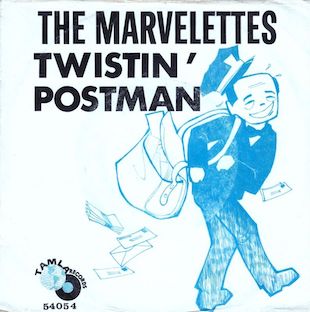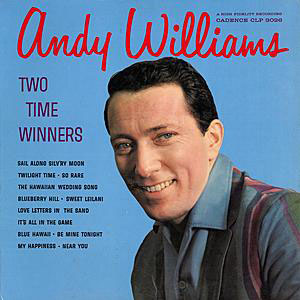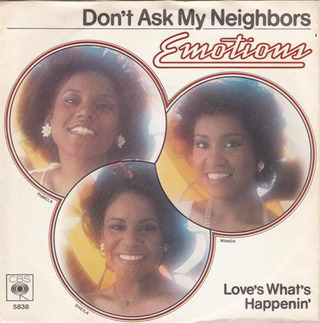"You're a Special Part of Me" was a successful duet single for soul singers and Motown label mates Diana Ross & Marvin Gaye, released in 1973. The original duet was one of the few originals featured on their famed album, Diana & Marvin, and was among the most successful of the songs the Motown label mates made reaching #4 on the Billboard R&B Singles chart and #12 on the Billboard Pop Singles chart.
"Who Can I Turn To?" (alternatively titled "Who Can I Turn To (When Nobody Needs Me)") is a song written by English composer-lyricists Leslie Bricusse and Anthony Newley and first published in 1964.
"Don't Knock My Love" is a hit song performed by R&B singer Wilson Pickett and written by Pickett with Brad Shapiro. Released in the spring of 1971 from the album of the same title, it spent a week at number-one on the Billboard Best Selling Soul Singles Chart and peaked at #13 on the Billboard Hot 100 Singles Chart. The song, which was produced under a funk tempo was Pickett's last number-one single and one of his last hits for Atlantic Records.
"Walk on the Wild Side" originated as the title song of the 1962 film of the same name as performed by Brook Benton over the film's coda and closing credits. Lyrics were written by Mack David and music was by Elmer Bernstein. The two earned an Oscar nomination for Best Original Song.
"Raise Your Hand" is a song written by Steve Cropper, Eddie Floyd, and Alvertis Isbell. It was recorded by Floyd and appeared on his 1967 debut album Knock on Wood. It was released as a single that year, where it reached #16 on the Black Singles Chart and #79 on the Pop Singles Chart.
"You" is a 1967 single released by American singer Marvin Gaye on the Tamla label.

"La-La " is an R&B/soul song by American vocal group the Delfonics. Released originally in December, 1967 by Philly Groove Records, the song was written by Thom Bell and William Hart, and produced by Bell and Stan Watson.
"Little Darling (I Need You)" is a 1966 single written and produced by Holland-Dozier-Holland and recorded and released by Marvin Gaye on the Tamla label.

"Take Your Time (Do It Right)" is the debut single by American R&B group the S.O.S. Band. It was released as the lead single from their debut studio album, S.O.S. (1980) on March 18, 1980 through Tabu Records, three months before the album's release.

"Another Star" is a song written and performed by Stevie Wonder from his 1976 album Songs in the Key of Life. It is the final track on side four of the double LP. The flute player Bobbi Humphrey appears in the last section of the song.
"I Guess I'll Always Love You" is a 1966 single by The Isley Brothers, released on Motown's Tamla label, and is a Holland–Dozier–Holland composition. In the US, the single made both the Hot 100, and R&B singles chart.
"The Love I Saw in You Was Just a Mirage" is a 1967 song recorded by the American R&B group The Miracles on Motown Records' Tamla label. Written by Miracles members Smokey Robinson and Marv Tarplin and produced by Robinson, it is noted for being the first single to bill the group as "Smokey Robinson" & the Miracles, a billing already present on the group's albums by this time. Miracles members Smokey Robinson and Pete Moore were the song's producers.

"Twistin' Postman" is a song recorded by Motown singing group The Marvelettes, who released it in 1961, and was the follow-up to their smash debut single, "Please Mr. Postman".
"The Glory of Love" is a song that was written by Billy Hill and recorded in 1936 by Benny Goodman. Goodman's version was a number one pop hit. The song has been recorded by many artists. It was the signature theme of the 1967 film Guess Who's Coming to Dinner, performed by nightclub singer Jacqueline Fontaine on camera, as well as over the opening and closing credits. Bette Midler included the song in the film Beaches (1988) and it appears on the soundtrack album.

"Stroke You Up" is a song by American R&B duo Changing Faces that was recorded for their eponymous debut album (1994). The song was released as the album's debut single on July 14, 1994. It was certified platinum by the RIAA and sold 700,000 copies domestically. It features uncredited vocals from R. Kelly. A remix version also written and produced by Kelly, which originally appeared on the soundtrack to the 1994 Keenen Ivory Wayans film A Low Down Dirty Shame.

Two Time Winners is the third studio album by American pop singer Andy Williams and was released in the spring of 1959 by Cadence Records. This, his third LP for the label, is composed of songs that had been successful on two previous occasions or in two different ways.
"Down and Out in New York City" is a song written by Bodie Chandler and Barry De Vorzon and recorded by James Brown. It appears in the film Black Caesar and is included on the film's soundtrack album. The song was co-arranged by Fred Wesley. It was released as a single in 1973 and charted #13 R&B and #50 Pop.
"Love of a Lifetime" is a 1986 single by Chaka Khan. The single was the first release from Chaka Khan's Destiny album. "Love of a Lifetime" was written by David Gamson and Green Gartside. Gartside performed backing vocals and also co-produced the single along with Arif Mardin. The music video was filmed on location at Long Island's Adventureland amusement park.
"Kalimba Story" is a song by R&B band Earth, Wind & Fire released as a single in 1974 on Columbia Records.

"Don't Ask My Neighbors" is a song recorded by R&B group the Emotions released as a single in 1977 by Columbia Records. The single reached No. 7 on the Billboard Hot Soul Singles chart.







